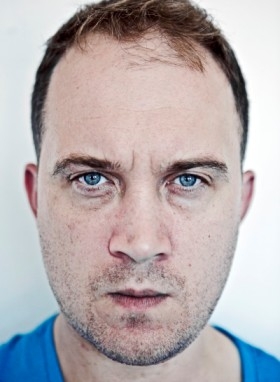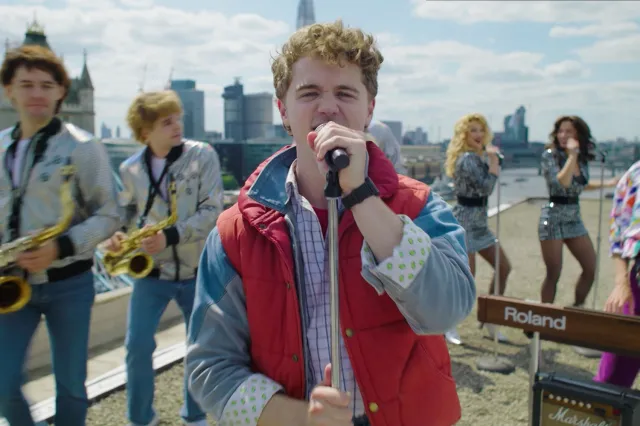Brief Encounter with … Chris Thorpe
The writer discusses ”Hannah”, his new version of ”Dr Faustus” at the Unicorn Theatre, and writing for younger audiences

What was it that interested you in the Faust legend and in Marlowe's Dr Faustus in particular?
I've always loved the play. It was one of the first ones I ever read – when I went to University in Leeds to study. I had to learn a speech from it, and so that kind of lodged it at the base of my brain – but there's also something so fundamental and simple about the story it deals with – of temptation, of obsession to the point of losing sight of what's important, and particularly of this idea of a rules-based Universe, of moral action and reaction, that we try to play out in the societies we've made, but that rarely works. And I'd studied and read plays from that period before, but this was the first where the language, particularly the verse sections, swept me up and away with it.
In many ways it seems like an unlikely choice for a children's show. Why do you think it's important to share this story with young audiences today?
Really? I think it's a great show for younger people – at an age where maybe you're having your first conflicts with authority and structure – and some of those structures you might have to exist in your entire life. I think there are two main things: one, the idea you're introduced to when you're young, that there is some kind of moral line – whether your upbringing is religious or not – which if crossed will bring down an external force to punish you, be that the state or your parents or the idea of God; and two, the fantasies that develop as you grow towards adulthood about possessing the power to shape the world. I think younger people are acutely aware, even now in what I'd think is a less overtly rules-based society, of the attractiveness of the power to break out of the social strictures and for good or ill to change the world around them. It's a play about how far you follow those questions.
I guess another thing that interested me was the difference between then and now. There's the idea in Faustus of Heaven and Hell and a supernatural punishment for breaking the rules. And while there are still a lot of people who grow up with and follow religion, and in a lot of ways that fear of power is still culturally ingrained for a lot of people, actually the world we live in, in terms of the exercise of political or moral power, doesn't tend to use those fears explicitly any more … this country has a lot less overt 'God' in it than the one Faustus was written in. So it's interesting to me what replaces that. “Because God says so” becomes “Because WHO says so?” Your parents? The government? Without that supernatural fear of damnation, what is it that makes you decide to be good, in the end – to not do harm? It might be just you in the end, who gets to make that decision. Let's have a think about that.
How have you adapted the story for young audiences?
The protagonist is an 11-year-old girl for a start – probably easier to identify with. And the things she wants … well I guess I've moved it away from the avarice and carnality that's in Faustus, towards a less self-centred set of wants and wishes. There are definitely points where Hannah is aware of the lure of fame and power in a world where she can do anything she wants, but I also wanted to think about how we treat other people, how we empathise, how we solve the problems facing humanity and how unlimited power creates problems with those as well.
I think the audience for this play will have a good awareness of what's going on in the world, environmentally, or militarily say, but are also really interested in the people around them being … real people, and how to be themselves, as freely as possible, while also allowing others to do the same.
Why did you feel that it was important to write the text in verse form?
It's the main thing I love about the original text. There's a real challenge when you're writing to fit into this pattern, but not become so seduced by it that you end up writing rhythm over content, and I hope I've done that. I love the creativity that's forced by the limitations of verse – you're forced to really break down what the character is thinking, and find a way you wouldn't normally say it to pin down the meaning and bend it to the structure of the lines. It's great to be able to throw in a rhyme occasionally and feel that it was right not only for the sound of the spoken text but fits the idea being expressed. It's the second play I've written using this verse form – the first was a kind of prequel to Robin Hood a few years ago. And in both those scripts I've tried to get a balance between direct expression and poetic language that works with the rhythm of the verse to drive things on. That's the beautiful thing about verse, it hopefully gives the text drive.

© Manuel Harlan
How did an awareness of the show's audience and its age influence your writing?
I haven't made any concessions in terms of language I think – the verse naturally lends itself to examining ideas in more depth within dialogue, and I tried not ever to think “is this too much for a young audience to understand?” That's not to say I was ever wilfully obscure either. It's about communication with passion and asking an audience – of whatever age – to do the right sort of work.
As I said, though, I've tried to re-work the temptations offered and the answers needed in the original to be more modern, but also reflect what I hope people are thinking about. The engagement with the fundamentals of who we are, our power, or lack of it, how we want to be treated and how we treat others – and how we treat the world – aren't age-dependent.
You recently wrote for family audiences in Northern Stage's Christmas show. How has writing with younger audience members in mind affected your work?
It's helped me worry less. There's always this imagined audience in my head and I'm thinking “will they get this? Will they accept this? Please don't let them hate me …” and that's just ego, basically. And ego of that kind's never useful – you have to consciously walk away from it I think. That imaginary audience doesn't really exist.
So writing for younger audiences is great because obviously there's still the same need to make sure you've interrogated the work, and not pulled your punches and done your thinking and not been scared of yourself – all the things you should be doing when you write for anyone, of whatever age. But there's also the great feeling that this audience is completely unaware, hopefully of you. Sitting behind the text asking yourself these questions – they don't care. They hopefully don't notice or think about you doing your job, and they couldn't care less about who you are and what you're worrying about – and that's brilliant – that puts you in the mindset you should be in every time you make something anyway.
Do you hope to write more shows for children and families in the future?
It's something we've been doing with Unlimited, who I work a lot with, over the past few years, and I think that gave me my first taste of it as a writer, collaborating with Jon and Clare on working out how to talk to these audiences …
So absolutely. I'm already planning a new one for next year – a different kind of verse this time, working with a metal band. But I don't think I'm allowed to say what it is yet. I think I've already broken down any internal distinctions I might have had between writing for adult or young audiences. I hope it's becoming, and will continue to be, just part of what I do.
Hannah runs at the Unicorn Theatre 8 February – 9 March.












